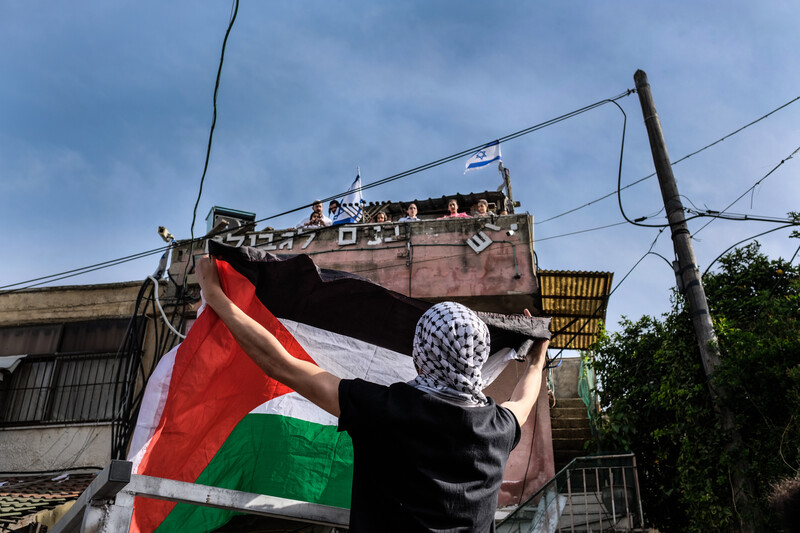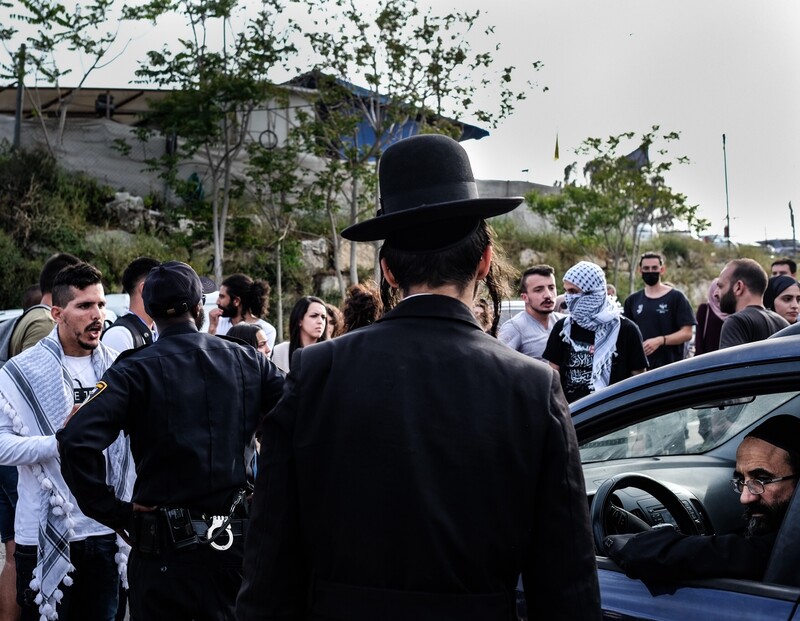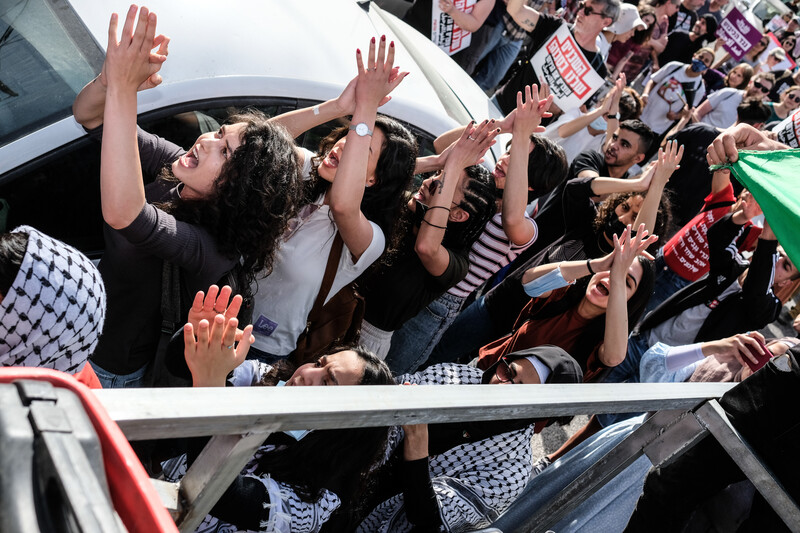The Electronic Intifada 12 May 2021

A protester holds a Palestinian flag outside the home of the Ghawi family, taken over by Israeli settlers in 2009.
Israeli flags protrude from the roof of a three story building in occupied East Jerusalem and sway with an eerie ease in a soft breeze.
The flags mark territory. Large letters, affixed to the front of the house, spell out roughly, in Hebrew: “And sons come back to their borders.”
Apparently part of a biblical quote, it is a rallying cry for religious Israeli settlers who see Palestine as their divine entitlement.
For the 500 Palestinian residents of the Karm al-Jaouni area in Sheikh Jarrah, this home is a constant reminder of a traumatic past and a potentially dark future.
What was once the home of three generations of the Ghawi family is now inhabited by Israeli settlers. It is also a stark symbol of an ongoing reality.
A total of eight families, some 78 people, including 28 children, are now threatened with eviction this year from homes and properties they have lived in for more than half a century.
Four of these families were due to be thrown from their homes earlier this month. But Israel’s high court has delayed a final ruling on their fate.
In total, 15 families in the area as well as in Batan al-Hawa are at risk of eviction after court proceedings by settler organizations seeking to eject them from their homes.
And their fate, the inexorable progress of cases through courts in which laws are designed to favor Jews over non-Jews, the powerlessness of Palestinian political leaders and apathy from foreign countries has finally, it seems, seen something crack.
Taking their anger onto the streets, Palestinians of the area and from the rest of Jerusalem have held daily protests here that, in recent days and weeks have spilled over to the rest of occupied East Jerusalem.
They have been met with brute force by armed Israeli police and troops that have, nevertheless, been so far unsuccessful in stemming the palpable anger of a population fed up with being shunted aside by lawyers and soldiers.
In fact, so determined have protesters proven themselves that the Israeli authorities were on Monday forced to reroute an annual march in Jerusalem held by Israeli nationalists to celebrate the occupation of the eastern part of Jerusalem in 1967.
Still, on the ground, there is only apprehension.
People here know their recent history. It is literally written in large Hebrew letters, staring them in the face every day.
Haunting memories
In 2009, the Ghawis, along with the Hanoun family (a combined total of 55 people) were forcefully kicked out of their homes, their furniture and belongings strewn across the lawn.
The memory is still fresh in the minds of all residents in this neighborhood.
“Israeli forces blew down the doors and threw children out to the streets,” Rasha Budeiri, 39, told The Electronic Intifada.
Rasha’s family home, where her parents Samira Dajani and Adel Budeiri live, sits across from the Ghawi house. Her parents are currently due to be evicted from their home on 2 August.
Rasha is the third generation of her family to have lived here.
Her Dajani grandparents acquired the home after they were forcefully expelled from their Jerusalem-area village Baka in 1948.
They were registered as refugees after they fled but avoided the refugee camps. They lived instead with relatives in Syria, then Jordan, until they came back to East Jerusalem in 1949.
They raised five children in East Jerusalem, where they lived for the rest of their lives.
Now, like the other families of the area, their children face the prospect of becoming homeless again. According to Rasha, they could feel it coming a long time ago.
“You could always see this look in the settlers’ eyes,” Rasha recalled of growing up in the neighborhood. “They would just stand and stare at the house and whisper. Some of them would throw stones at us. My uncles and mom would tell us to never leave the house unattended.”
An ongoing Nakba
The houses here were built in 1956 as part of joint efforts between UNRWA, the UN agency for Palestine refugees, and the Jordanian government.
Those efforts resulted in 28 housing units being built for people displaced during the Nakba, the 1948 ethnic cleansing of Palestine.
In exchange for the homes, the 28 Palestinian families had to give up their refugee status.
The cases now against them allege that the lands these properties were built on belonged to Jewish owners before Israel was created in 1948.
Such claims rest on legal foundations – two laws in particular – unique to Israel. The legislation has been crucial to the Israeli state’s takeover of Palestinian property.
Discrimination that favors Jewish claimants while denying similar recourse to Palestinians has been enshrined in Israeli law.

Protesters argue with Israeli police as they try to block traffic in Sheikh Jarrah.
In 1950, two years after the state was established, Israel enacted the Absentees’ Property Law, designating Palestinians forced to flee to neighboring countries in 1948 as “absentees” and placing their properties under Israel’s jurisdiction.
The homes were then handed out to Jewish immigrants – who were and are entitled to Israeli citizenship wherever they are born – as and when they arrived in the new country. Palestinians, on the other hand, were then and are still denied their right to return.
Once Israel occupied East Jerusalem in 1967, the 1970 Legal and Administrative Matters Law was enacted. It allows Israeli Jews to pursue ownership claims to properties that had been under Jordanian custodianship since 1948, and preceded the establishment of the state.
The same rights are not extended to Palestinians.
In Sheikh Jarrah, the management of the Karm al-Jaouni land was for a while taken over by the Israeli government’s Custodian General and then later transferred to two committees – the Sephardic Community Committee and the Knesset Israel Committee.
Legal action commenced in the early 1970s, when lawsuits were first filed against all 28 Palestinian families. But it was not until 2008, after a US-based settler group, Nahalat Shimon International, bought the disputed land rights, that the first family was forcefully evicted from their home in the area.
Settler zealotry
Nahalat Shimon ultimately aims to evict all Palestinians from the Karm al-Jaouni land and demolish their homes as part of a new settlement project called Simon HaTsadiq that would see 200 settlement units built.
And the settlers’ zeal has created bizarre situations.
In 2009, the Kurd family had half their home taken over by Israeli settlers, just a bed sheet now separating them from a daily barrage of provocation and intimidation.
“It never stopped … the harassment, the verbal abuse, training their dogs to be vicious towards us, calling the police all the time on us or having parties in our yard, coming home to find them having opened the doors and sitting in our living room,” Mohammed El-Kurd told The Electronic Intifada.
The Kurds have been battling in the Israeli courts for their right to remain in their home since 1972.
Mohammed El-Kurd’s grandmother, who died recently at the age of 103, continued to hold out hope that they would be able to stay in the home.
“If she was alive today this would be her fourth forced displacement,” El-Kurd said during a webinar hosted by Al-Haq, a legal rights group, and numerous other Palestinian organizations on 14 April as part of the #SaveSheikJarrah social media campaign.
But the outlook is not promising.
Following a ruling in the Jerusalem District Court on 15 February, the appeals of four families, totaling 30 people, were rejected. The families were issued eviction orders to be carried out by 2 May.
In addition to the evictions – now deferred, at least for the time being – the families face legal fees of more than $21,000 each to be paid to Nahalat Shimon.
Three other families totaling 25 Palestinians, are facing evictions in August along with charges totaling around $9,000 per family. Among them are Rasha Budeiri’s family.
“They are still chasing our basic human right of existence,” Rasha told The Electronic Intifada. “You always have to worry about where you will have to sleep the next day. This is no way for anyone to live.”
Nowhere to go
Sheikh Jarrah is the frontline of a broader battle being waged by far-right organizations to expel Palestinians from the city generally and Judaize all of East Jerusalem.
According to Fayrouz Sharqawi of the Jerusalem-based Grassroots Al-Quds organization, Israel’s goal since 1967 has been to keep Palestinian numbers below 40 percent of the general population of Jerusalem.
This is also outlined in Israel’s Masterplan 2000 – a city-wide urban and zoning scheme that makes no distinction between the western and eastern parts of the city.
“In order for them to achieve this demographic imbalance, different policies of displacement have been designed and implemented in Jerusalem,” Sharqawi told The Electronic Intifada.
Grassroots Al-Quds aims to unite various groups in Jerusalem as part of a strategy for the survival of the Palestinian community there. The organization has been conducting research on the deliberate fragmentation of Palestinian communities in East Jerusalem since its founding in 2011.

A protest against the threatened evictions of Palestinian families in Sheikh Jarrah,
According to Sharqawi, there is a clear network of collusion between the Israeli judicial system, settler organizations and Israeli occupation forces. Such collusion enables systematic discrimination against Palestinians.
While cases wind their way through courts, the settlers’ presence and subsequent increase in police force and surveillance in affected areas also create a perpetual state of fear among residents.
“They have cameras that capture your every movement. Even settlers who don’t live here and just come into the neighborhood, are all armed with weapons.. They always call the police on us and it is always our fault,” Aref Hammad, 70, told The Electronic Intifada.
Hammad was born and raised in the Karm al-Jaouni area of Sheikh Jarrah. His family is originally from Haifa from where it was forcefully expelled in 1948.
Along with eight relatives in the house, the youngest grandchild just 18 months, Hammad is facing eviction from his home in August.
“There is a lot of danger and pressure and circumstances that make you feel psychologically pressured,” Hammad said. “But I’m not giving up.”
Not a fair fight
The drawn-out court cases give an illusion of due process, said Fayrouz Sharqawi from Grassroots Al-Quds.
“There is always this sense that the bad people are the settlers and everyone else is ok, at least there is law and order,” she told The Electronic Intifada. “Yes, there is law here, but the law itself is racist.”
“We should be very careful not to present this as there is a state and there is a law, and there is law and order and there are outlaws,” she continued. “No, it is all racist … the institution, the legislative branches of it, the implementation, everything.”
All seven families plan to appeal any court ruling in efforts to stall the evictions. But their chances are slim, according to Aseel AlBajeh, a legal researcher with Al-Haq.
“From the experience of all the families in East Jerusalem, whenever you are issued an eviction order from the Magistrate Court, it is just a matter of time before you are forcefully evicted,” AlBajeh told The Electronic Intifada.
Residents and activists have been putting their hope in tireless advocacy work and social media campaigns in an attempt to provoke international intervention.
On 22 April, the 500 residents of Sheikh Jarrah along with 191 Palestinian, Israeli and international rights organizations, sent a letter to the International Criminal Court (ICC).
The ICC has undertaken to investigate war crimes committed in Palestine. In their letter, the Sheikh Jarrah residents argued that the investigation should include the forced displacement of Palestinians from East Jerusalem.
In the meantime, residents are steeling themselves for the battles that lie ahead.
“As a child I witnessed them [the settlers] act with such arrogance,” Mohammed El-Kurd told The Electronic Intifada. “The story does not begin or end with loss of property. It is the psychological torture, the financial drain … this is not a fair legal fight, this is a political one.”
Kelly Kunzl is an American freelance journalist, reporting on Palestine.





